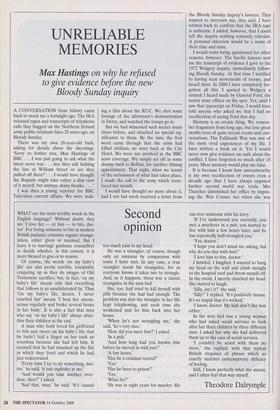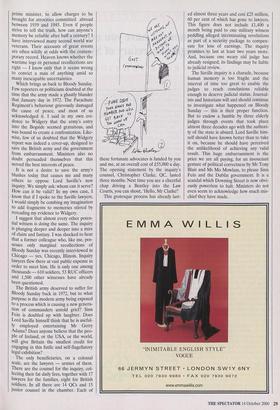UNRELIABLE MEMORIES
Max Hastings on why he refused
to give evidence before the new Bloody Sunday inquiry
A CONVERSATION from history came back to mock me a fortnight ago. The IRA released tapes and transcripts of telephone calls they bugged on the Northern Ireland army public-relations lines 28 years ago, on Bloody Sunday.
There was my own 26-year-old bark, asking for details about the shootings. `Sorry to bother you, Max Hastings of BBC . . . I was just going to ask what the latest score was . . . Are they still holding the line at William Street or are they pulled off there? . . . I would have thought the Bogside might take rather a dim view of it myself, but anyway, many thanks. . . . '
I was then a young reporter for BBC Television current affairs. We were mak- ing a film about the RUC. We shot some footage of the afternoon's demonstration in Derry, and watched the troops go in.
But we had witnessed such scenes many times before, and attached no special sig- nificance to them. By the time the first word came through that the army had killed civilians, we were back at the City Hotel. We were not involved in the BBC news coverage. We simply set off in some dismay back to Belfast, for another filming appointment. That night, when we learnt of the seriousness of what had taken place, I made the call to the army which resur- faced last month.
I would have thought no more about it, had I not last week received a letter from the Bloody Sunday inquiry's lawyers. They wanted to interview me, they said I have written back to confirm that the IRA tape is authentic. I added, however, that I could tell the inquiry nothing remotely relevant. A personal interview would be a waste of their time and mine.
I would resist being questioned for other reasons, however. The Saville lawyers sent me the transcript of evidence I gave to the 1972 Widgery inquiry, immediately follow- ing Bloody Sunday. At that time I testified to having seen movements of troops, and heard shots. In 2000 I have completely for- gotten all this. I quoted to Widgery a remark I heard made by General Ford, the senior army officer on the spot. Yet, until I saw that typescript on Friday, I would have told anyone who asked me that I had no recollection of seeing Ford that day.
Memory is an erratic thing. We remem- ber fragments from long ago, but lose great . swaths even of quite recent events and con- versations. The Falklands War was one of the most vivid experiences of my life. I have written a book on it. Yet I would never now give evidence on oath about the conflict. I have forgotten so much after 18 years. Mere memory would play me false.
It is because I know how untrustworthy is my own recollection of events even a decade ago that I have always opposed further second world war trials. Mrs Thatcher diminished her office by impos- ing the War Crimes Act when she was prime minister, to allow charges to be brought for atrocities committed abroad between 1939 and 1945. Even if people strive to tell the truth, how can anyone's memory be reliable after half a century? I have interviewed many second world war veterans. Their accounts of great events are often wildly at odds with the contem- porary record. Heaven knows whether the wartime logs or personal recollections are right — I know only that it seems wrong to convict a man of anything amid so many inescapable uncertainties.
Which brings us back to Bloody Sunday. Few reporters or politicians doubted at the time that the army made a ghastly blunder that January day in 1972. The Parachute Regiment's behaviour grievously damaged the cause of peace, and most of us acknowledged it. I said in my own evi- dence to Widgery that the army's entry into the Bogside seemed gratuitous, and was bound to create a confrontation. Like- wise, few of us doubted that the Widgery report was indeed a cover-up, designed to save the British army and the government from embarrassment. Ministers also no doubt persuaded themselves that this served the best interests of peace.
It is not a desire to save the army's blushes today that causes me and many others to oppose Lord Saville's new inquiry. We simply ask: whom can it serve? How can it be valid? In my own case, I know that if I spoke to the Saville lawyers, I would simply be combing my imagination to add fragments to memories stirred by rereading my evidence to Widgery.
I suggest that almost every other poten- tial witness is doing the same. The inquiry is plunging deeper and deeper into a mire of claim and fantasy. I was shocked to hear that a former colleague who, like me, pos- sesses only marginal recollections of Bloody Sunday was recently interviewed in Chicago — yes, Chicago, Illinois. Inquiry lawyers flew there at vast public expense in order to meet him. He is only one among thousands — 610 soldiers, 53 RUC officers and 1,500 other witnesses have already been questioned.
The British army deserved to suffer for Bloody Sunday back in 1972, but to what purpose is the modern army being exposed to a process which is causing a new genera- tion of commanders untold grief? Sinn Fein is doubled up with laughter. Does Lord Saville himself think that he is useful- ly employed entertaining Mr Gerry Adams? Does anyone believe that the peo- ple of Ireland, or the USA, or the world, will give Britain the smallest credit for engaging in this futile and self-flagellatory legal exhibition?
The only beneficiaries, on a colossal scale, are the lawyers — armies of them. There are the counsel for the inquiry, col- lecting their fat daily fees, together with 17 lawyers for the families, eight for British soldiers. In all there are 14 QCs and 15 junior counsel in the chamber. Each of these fortunate advocates is funded by you and me, at an overall cost of £55,000 a day. The opening statement by the inquiry's counsel, Christopher Clarke, QC, lasted three months. Next time you see a cheerful chap driving a Bentley into the Law Courts, you can shout, 'Hello, Mr Clarke!'
This grotesque process has already last- ed almost three years and cost £25 million, 60 per cent of which has gone to lawyers. This figure does not include £1,400 a month being paid to one military witness peddling alleged incriminating revelations as part of a security package to compen- sate for loss of earnings. The inquiry promises to last at least two years more. And, because one weary old judge has already resigned, its findings may be liable to judicial review.
The Saville inquiry is a charade, because human memory is too fragile and the interval of time too great to enable the judges to reach conclusions reliable enough to deserve judicial status. Journal- ists and historians will and should continue to investigate what happened on Bloody Sunday — this is their proper function. But to endow a fumble by three elderly judges through events that took place almost three decades ago with the authori- ty of the state is absurd. Lord Saville him- self should have known better than to take it on, because he should have perceived the unlikelihood of achieving any valid result. This huge embarrassment is the price we are all paying, for an insouciant gesture of political correctness by Mr Tony Blair and Ms Mo Mowlam, to please Sinn Fein and the Dublin government. It is a scandal which Downing Street is now obvi- ously powerless to halt. Ministers do not even seem to acknowledge how much mis- chief they have made.



















































































 Previous page
Previous page